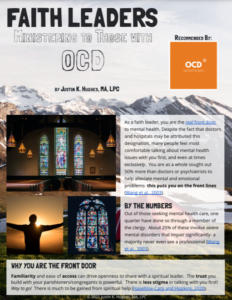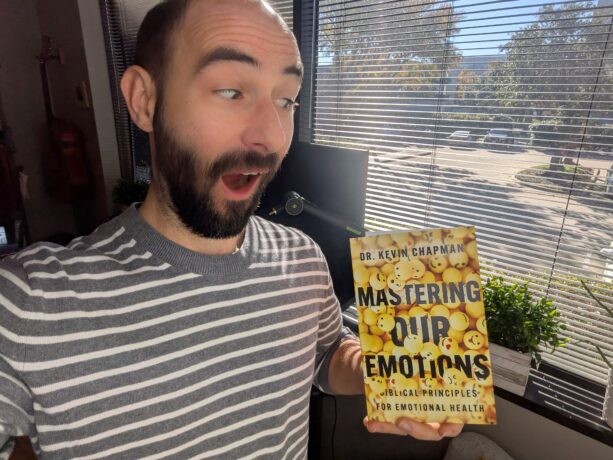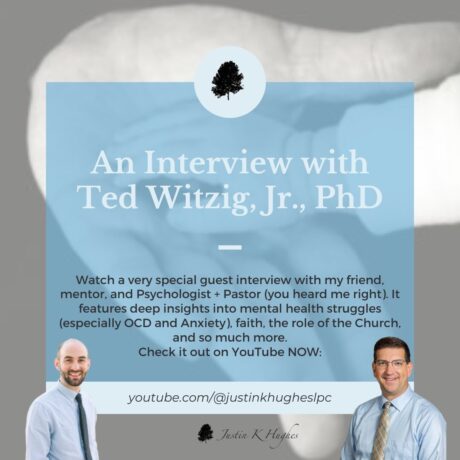
As a faith leader, you are the real front door to mental health. Despite the fact that doctors and hospitals may be attributed this designation, many people feel most comfortable talking about mental health issues with you first, and even at times exclusively. You are as a whole sought out 50% more than doctors or psychiatrists to help alleviate mental and emotional problems- this puts you on the front lines (Wang et al., 2003).
Seeking spiritual leaders- by the numbers.
Out of those seeking mental health care, one quarter have done so through a member of the clergy. About 25% of these involve severe mental disorders that impair significantly- a majority never even see a professional (Wang et al., 2003).
Why you are the Front Door.
Familiarity and ease of access can drive openness to share with a spiritual leader. The trust you build with your parishioners/congregants is powerful. There is less stigma in talking with you first! Way to go! There is much to be gained from spiritual help, as you well know (Haseltine-Carp and Hopkins, 2020).
The Burden You Bear
The great opportunities elucidated above are also met with challenges. You may be expected to be a “one-stop-shop” for all the problems a person has, including the most severe situations, as already established. Only those on the inside of ministry know the toll this can take. Even those with strong boundaries still wrestle with the weight of trying to help, feeling guilty if they cannot assist, or if they must turn someone away. The perception of saying no or just not working with someone can be more difficult for you, whether through personal or external pressures to help.
Crisis and emergent situations come up often for clergy, and without extensive training as a clinician, you may feel lacking in knowledge and confidence.
Issues of confidentiality are common sources of concern, and the ‘pipeline’ of communication that could exist with clinicians is weak, at best, if not tedious (Rudolfssen and Milstein, 2019). The ‘systems-that-be’ often make coordination of care extremely difficult- even for the initiated.
Certainly not unimportant is that health clinicians usually overlook faith concerns by not gaining a history that’s appropriately balanced with the level of significance that spiritual issues have for most (Koenig, 2012). It would thus be reasonable for you to have questions like the following:
- “Will they be referred back to our place of worship?”
- “Will the person trust me/us/God if I offer a referral?”
- “Will the person in question feel abandoned or hurt for involving someone else in their care?”
- “What if I fail to do my job and/or miss something that could have been addressed by our congregation and/or spiritually?”
- “Am I walking by faith and trust in recommending a medical or mental health provider?”
- “Is this in the person’s best interests?”
Opportunity To Collaborate
The great opportunity is this: you are the front door to mental and emotional health. Our professions serve well working together in alleviating the suffering and/or helping people grow through it, but for too long have been distant, at best. It is reported that as a whole, parishioners/members are very confident in clergy to give guidance as to faith issues, but less confident in personal matters (Pew Research, 2019). Working together can help bridge this gap of developing trust and overall care of those in our care.
As OCD specialists and advocates, we would like to help both the sufferer of OCD and also those who are connected and may feel uncertain or just plain lost when it comes to this confusing disorder (only until it’s understood).
OCD in context.
You may already be very familiar with OCD. Maybe you’ve come across a person who appears more guilt-ridden than average. Maybe you’ve picked up on themes of scrupulous confession, repetitive thoughts, or relationship-impacting compulsive behaviors. Maybe it’s in the form of someone who just can’t stop washing, checking, or thinking about a certain topic- be it spiritual, relational, a fear of harm or hyper-responsibility.
Though the most common obsessional concern is contamination and the most frequent compulsions involve checking and/or cleaning/washing, there is remarkable diversity in how people struggle with OCD. Any fear or discomfort a person may have can be implicated in OCD.
Common Obsessions:
Contamination
Doubt
Perfectionism
Harm to others or self
Somatic (body and health) concerns
Sexual or violent thoughts
Religious/scrupulous/existential thoughts
Common Compulsions:
Washing/cleaning
Checking
Repeating
Mental rituals (praying, counting, reviewing)
Reassurance seeking
Ordering
Avoidance (including distraction and suppression)
Asking/Confessing
Neutralizing/Suppressing
What is OCD?
Obsessive Compulsive Disorder (OCD) is a mental health disorder characterized in three parts. First, Obsessions are intrusive and unwanted thoughts, urges, or impulses which cause marked distress or anxiety. They are recurrent & persistent. Secondly, Compulsions, or rituals, are attempts to avoid, suppress, ignore, or neutralize such distress (whether experienced as disgust, fear, doubt, a desire for completeness, etc.). This can be either through overt behavior or thought (“mental acts”). They are aimed at minimizing or avoiding distress or anxiety. The final part is the level of impact and life disruption that is caused (DSM, 2013). Though the definition has tightened over time with more study, by and large various descriptions throughout history can be seen reflecting OCD. In fact, it was the clergy who were some of the first to catalogue obsessions and rituals (Stanford, 2021)!
Who has OCD?
About 1-2% of the population can be diagnosed with OCD, across socioeconomic, cultural, gender, religious, and other differences (Ruscio et al., 2008)- that’s over 150 million people worldwide. That’s not insignificant, especially considering that it causes some of the greatest disability in the world.
A majority of all people, with or without OCD, endorse having intrusive thoughts. Those with OCD have a brain-based disorder that repeatedly sets off their neurobiological “alarm system”, which makes it more difficult and distressing to ignore and move on from intrusive thoughts. This is not to be reductionistic. As a spiritual person and thinker, you may appreciate how empirical science can be used to over-simplify human suffering. Brain scans are not causal by any means, either. However, hopefully this article can help contribute to the appreciation of the biological, behavioral, cognitive, and emotional processes that maintain something that we label “OCD.” There may be spiritual factors at play, as with any person- but there are treatments that are are well-equipped to address OCD in most people.
What Causes OCD?
The exact cause of OCD is unknown. There is a strong genetic component (it “runs in families”), being moderately inherited, with estimates ranging widely from 27% to 65% (Ruscio et al, 2008).
Neurobiological abnormalities (brain scans look different in someone with OCD) are thought to abound. Strep infection, particularly in childhood, is still being researched as an onset of severe symptoms. Stress may trigger OCD, though this is typically true with many conditions. Traumatic brain injuries (TBI), especially in childhood, increase the association. (Grados et al., 2008). Theories abound as to other causes be it environmental, post-natal, and more.
How Impactful is OCD?
OCD can be very debilitating. In its global research, the World Health Organization lists OCD with anxiety disorders as the “sixth largest contributor to non-fatal health loss” (disability) (WHO, 2017). This is considering ALL illness- ‘physical’ and ‘mental.’ Two out of three individuals with OCD report experiencing severe impairment in domains of life such as work, relationships, school, etc. (Gillihan et al., 2012).
What successful treatments exist?
The two treatments of choice are CBT, specifically utilizing Exposure and Response Prevention (ERP) and SRI’s.
The efficacy of ERP is high. 80% of participating patients respond well to a trial of ERP, with an average symptom reduction of 60 – 70 % (Foa, 2010; Abramowitz & Jacoby, 2015)!
SRI’s (medication) are also beneficial, with 40-60% of patients responding with an average of 20 – 40% symptom reduction (Steketee, 2012).
There are other treatments that are used, but these two are considered the first choices.
Gap between evidence and practice.
In a survey of advanced level (Ph.D) mental health clinicians treating OCD, 26% said they seldom or never use exposure for OCD. We might expect the numbers to be even more stark for those with even less training. There is evidence to believe that only around 20% of patients will receive exposure therapy for any type of anxiety disorder/OCD (Sars et al., 2015; Goisman et al., 1993). Children with all types of anxiety disorders rarely receive exposure therapy (Whiteside et al., 2016). Many in the general public also have strong negative beliefs about exposure, which extends as well to faith leaders.
Advocacy and your help. How you can make a difference!
OCD can be overwhelming. It was thought to be untreatable as recent as a few decades ago (Lack, 2012). Incredible advances have led to extraordinarily effective treatments for most who pursue effective evidence-based treatments. How to help someone with OCD:
- Simply use your already-incredible skill set to ask a straightforward question to someone who is suffering: “Have you ever been diagnosed with any disorder or OCD? If not, do you suspect it?”
- Kindly offer your observations to the person you are speaking with. Examples you might use:
- I have observed repeated patterns that are concerning. Most people I talk with feel they are better able to move on from ______ once we have talked or given resources.
- I can’t put my finger on it, but there appears to be some repetitive/obsessive thought processes and/or behaviors, such as ______.
- Your attention to doing the right thing/morality/prayer/responsibility is commendable- I can tell you really care. It sounds as though some of these cross into hypervigilance/guilt/fear/shame and don’t seem to result in joy/confidence/faith/patience/tolerance.
- Get someone started in discovery and education. NO PRESSURE to have to figure out a diagnosis- that’s not your responsibility! Start here:
-
- IOCDF.org (there’s also a “Find Help” tool that will locate specialists who can determine if treatment is needed- on occasion clients learn they don’t have OCD, but can still gain tips and guidance and then ideally be sent back to you for their spiritual care)
- OCDGamechangers.com
- JustinKHughes.com many posts touch on the integration of faith and OCD)
- YouTube intro “Ultimate Guide to ERP for OCD”
- Supporting Your Loved One With OCD Guide (not just meant for family, but also helpers, ministers, etc.)
-
- Using any of the information above, you can also locate a referral if you don’t have one already- a knowledgeable clinician (use the IOCDF.org “Find Help”).
- Take joy in helping, knowing you are already doing so much!!!
Of course, a holistic view of a person is not only biological, psychological, and social, but spiritual as well. Our field as medical and mental health providers has done a very poor job of collaborating with faith leaders. It’s high time we work with you and acknowledge the marked role you have. Working together will hopefully minister to those with OCD more effectively.
With deep gratitude,
Justin K. Hughes, MA, LPC
(Graduate, Dallas Theological Seminary)
Want to Download this article as a FREE guide to share?
Click on it to join and Get Unstuck
References:
Abramowitz, J. S., & Jacoby, R. J. (2015). Obsessive-compulsive disorder in adults (pp. 22-23). Boston: Hogrefe.
Boileau B. (2011). A review of obsessive-compulsive disorder in children and adolescents. Dialogues in clinical neuroscience, 13(4), 401-11.
Clark, D. A., & Radomsky, A. S. (2014). Introduction: A global perspective on unwanted intrusive thoughts. Journal of Obsessive-Compulsive and Related Disorders,3(3), 265-268. doi:10.1016/j.jocrd.2014.02.001
Ellison, C., Vaaler, M., Flannelly, K., & Weaver, A. (2006). The Clergy as a Source of Mental Health Assistance: What Americans Believe. Review of Religious Research, 48(2), 190-211. Retrieved February 8, 2021, from http://www.jstor.org/stable/20058132
Gillihan, S. J., Williams, M. T., Malcoun, E., Yadin, E., & Foa, E. B. (2012). Common Pitfalls in Exposure and Response Prevention (EX/RP) for OCD. Journal of obsessive-compulsive and related disorders, 1(4), 251-257.
Heseltine-Carp W, Hoskins MClergy as a frontline mental health service: a UK survey of medical practitioners and clergyGeneral Psychiatry 2020;33:e100229. doi: 10.1136/gpsych-2020-100229
Koenig H. G. (2012). Religion, spirituality, and health: the research and clinical implications. ISRN psychiatry, 2012, 278730. https://doi.org/10.5402/2012/278730
Grados, M. A., Vasa, R. A., Riddle, M. A., Slomine, B. S., Salorio, C., Christensen, J., & Gerring, J. (2008). New onset obsessive-compulsive symptoms in children and adolescents with severe traumatic brain injury. Depression and Anxiety, 25(5), 398-407. doi:10.1002/da.20398
Lack C. W. (2012). Obsessive-compulsive disorder: Evidence-based treatments and future directions for research. World journal of psychiatry, 2(6), 86–90. https://doi.org/10.5498/wjp.v2.i6.86
Nestadt, G., Grados, M., & Samuels, J. F. (2010). Genetics of obsessive-compulsive disorder. The Psychiatric clinics of North America, 33(1), 141-58.Ponniah et. al, 2013.
Pew Forum (Ed.). (2020, May 05). Most congregants trust clergy to give religious advice. Retrieved February 10, 2021, from https://www.pewforum.org/2019/11/15/most-congregants-trust-clergy-to-give-advice-about-religious-issues-fewer- trust-clergy-on-personal-matters/
Stanford Website. Obsessive-Compulsive and Related Disorders. (n.d.). History. Retrieved February 08, 2021, from http://med.stanford.edu/ocd/treatment/history.html
Rudolfsson, Lisa & Milstein, Glen (2019) Clergy and mental health clinician collaboration in Sweden: Pilot Survey of COPE, Mental Health, Religion & Culture, 22:8, 805-818, DOI: 10.1080/13674676.2019.1666095
Ruscio, A. M., Stein, D. J., Chiu, W. T., & Kessler, R. C. (2008). The epidemiology of obsessive-compulsive disorder in the National Comorbidity Survey Replication. Molecular psychiatry, 15(1), 53-63.
Sars, D., & van Minnen, A. (2015). On the use of exposure therapy in the treatment of anxiety disorders: a survey among cognitive behavioural therapists in the Netherlands. BMC psychology, 3(1), 26. doi:10.1186/s40359-015-0083-2
Steketee, G. (2012). The Oxford handbook of obsessive compulsive and spectrum disorders (pg. 295). New York: Oxford University Press.
Whiteside, S. P., Deacon, B. J., Benito, K., & Stewart, E. (2016). Factors associated with practitioners’ use of exposure therapy for childhood anxiety disorders. Journal of anxiety disorders, 40, 29-36.
Depression and Other Common Mental Disorders: Global Health Estimates. Geneva: World Health Organization; 2017. Licence: CC BY-NC-SA 3.0 IGO
Wang PS, Berglund PA, Kessler RC. Patterns and correlates of contacting clergy for mental disorders in the United States. Health Serv Res. 2003 Apr;38(2):647-73. doi: 10.1111/1475-6773.00138.









I have followed you for ages, your articles are always amazing. I just want to thank you for this important , well presented piece. I am definitely a fan of all you do and will continue to like and share your content on our social media.
Kim Vincenty
OCD Jacksonville
Kim, wow, I am honored to hear that from you, especially from a rockstar advocate for those with OCD. Being the president of the Jacksonville affiliate, you clearly are working hard to bring hope to a lot of people- thank you for that! I look forward to hopefully connecting at a future in-person conference when able! Is there anything else you / your team would like posts to cover? Any needs in the community that aren’t being addressed?
~Justin